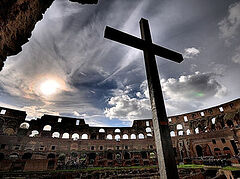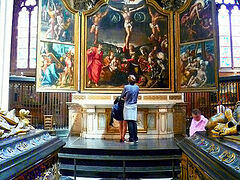It’s a fact: The monasteries need money. Another thing is when it becomes the chief objective of the monastery’s existence. What future lies ahead for the monasteries known earlier as the “luminaries of Orthodoxy”?
“And now let’s look at the infamous James Bond monastery!” announced a tour guide, skillfully stepping away and allowing her tour group members to click another couple hundred or more of megabytes of photos on their smartphones.
It was a relief to hear the reaction of the tourists, regardless of the fact they were Germans (it would be a stretch to call them pilgrims by any means!):
“But we came to Meteora to see your monasteries, not Hollywood props,” a few of them replied quietly but sharply. “We are interested in Orthodoxy, not ‘Agent 007.’ “
The church looked as if it was a museum during the free admission day. Or, rather, not a museum but a supermarket
“Well, of course,” the young tour guide swiftly changed her tune. “Let’s quickly step inside. We’ve got a few minutes—you see, other tour groups are waiting to enter! A reminder: If you plan to go inside the monastery, women must wear scarves and skirts that you can rent at the monastery kiosk for five euros. I repeat: we only have a few minutes.”
The monastery looked like a museum during its free admission hours. Dozens, if not hundreds of visitors divided into groups were trying hard in all this ruckus to listen to their tour guides and learn at least a few bits of information about the history of the Meteora monasteries, Greek Orthodoxy, the restoration of Hellenic independence, and the resistance to the Ottoman rule… No way! A conveyor belt of tour groups didn’t allow even the slightest chance to take a closer look at the frescoes, never mind satisfing one’s desire to spend a moment alone, or step away and pray in peace. “It’s not even a museum, it looks more like a supermarket,” some of the German visitors whispered indignantly.
“Well, we have to move faster as we have to give space for another group coming in. Once we step outside, we will be at the observation deck (isn’t it beautiful?) where you are allowed to take photos. I will meet you at the monastery gift store (you should definitely check it out as they have lots of interesting things at really decent prices), and then we are going to move on to another monastery which is also just as beautiful and exciting.”
The tourists in the guided tour groups spend most of their time inside those monastery gift shops buying all kinds of knickknacks, possibly in a simple attempt to keep a mental account of places they have visited.
We took a deep breath after having toured a few Meteora monasteries at breakneck speed. Our tour guide also took a big sigh of relief:
“Whew, we can finally take a break after this wild ride. What do you think of our beautiful country?”
I couldn’t hold back:
“Sure, it’s beautiful and all that, but there’s too much rushing around. Look, even some kindred spirits amongst the Germans complained—they said they wanted to spend a few moments in silence, and some even in prayer (it happens with Germans, too!), but instead of a peaceful monastery, they visited Walmart on Black Friday or something like that. Never mind a pilgrimage—even the tourist trade has been abandoned for the sake of moneymaking.”
The monasteries pretty much make a living off tourists—that’s why we prop up our tour program with Hollywood. The merrier the better
That’s when our tour guide sighed with a straight face:
“But you are right. And sorry about James Bond—it’s a lot easier for us to use this particular tone when we speak about the Meteora monasteries these days. The monasteries subsist pretty much at the expense of the tourists—that’s why we prop up our tour program with Hollywood and all that. The merrier the better, so to speak. We need to add more fun stuff to our programs. This way, the monasteries will have more money.”
“I see, but what about prayer, or solitude…”
“You wish! (Another sigh, this time even more doleful). You see, that’s how it works here: The monasteries close for tourists during the services, and it means no one but the monastics can be present there. And then there is “business time” between liturgy and vigil: tourists simply need to spend money, that’s all. I think we who belong to the world outside the monastery walls, aren’t expected to pray but to bring money. I see you frown. I am an Orthodox, too, and this new order of things feels disgusting to me, as well, but I have to work and earn money—I’ve no choice! If it can console you, I’ll let you in on a secret: There is a tiny skete at the foothills of Meteora—that’s where I advise you to go and pray. They keep it the old-fashioned way. That’s the only place where our fellow Greeks from nearby villages and towns go to pray—all those “business monasteries” with their souvenirs and tourist baits is a huge turn-off for us. You know, I once caught myself thinking I was in a ghetto during one of my tours…
We built this ghetto with our own hands. All we need is money. As for prayer: not so much
“How’s that?”
“Quite simple: The tourists once saw a nun walking from a church back to her cell. They were beside themselves from delight so that some even whistled: “Look! A live nun! All in black! Wow! So cool!”
“We had something like that during the Soviet times. We’d visit the monasteries just like them to gawk at monks and have a laugh.”
“Welcome back to the past then.”
“As long as it’s not back to the future. It does resemble a ghetto though.”
“The worst thing is that we built this ghetto ourselves. All we need is money. As for prayer: not so much. Hellas is what I grieve for.”
“What if not all is lost yet?”
“I’d like to hope so.”
We parted ways with our tour guide. She gifted us with an icon. The Germans fiddled with it in their hands a bit and then said, “What shall we do with it? We know nothing about icons. Take it to Russia, maybe you can donate it to a monastery or a church.” At that point, I was dying to go back to Russia. And once there, I’d go visit a tiny monastic community: maybe the Kamenny monastery, or the one in Sura, or the Siya monastery, or go to St. Triphon Pechenga monastery;1 that is, basically any place where even tourists can become pilgrims. Where the word “money” is still taken at face value and the word “prayer” is still the essence.





